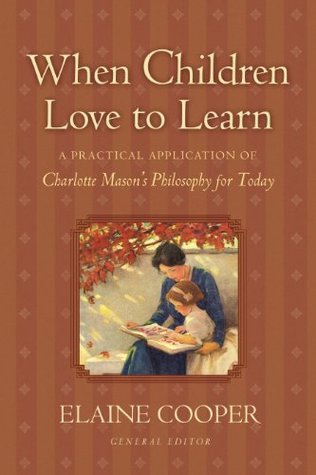More on this book
Kindle Notes & Highlights
by
Eve Anderson
We offer no technique, but rather the simple proposition that children are best educated through careful relationships on the part of the adults—the parents and teachers— who are themselves in a lifelong process of learning and subject to the same duties and freedoms within a Christian worldview. Beyond that, each parent, teacher, or school needs to make thoughtful application of the many ideas presented in the following pages to the specific concerns and goals particular to their situations. In this guide are many practical suggestions and resources from which to choose.
Essence of Charolette Mason approach. It requires conviction and a commkotment to lifelonv learning on the part of teachers.
Skyler Chaney liked this
Our crying need today is less for a better method of education than for an adequate conception of children—children merely as human beings, whether brilliant or dull, precocious or backward. Exceptional qualities take care of themselves and so does the “wanting” intelligence, and both of these share with the rest in all that is claimed for them in the following chapters. Our business is to find out how great a mystery a person is qua person.4
“Progressive” education became the vogue. It was seen as liberating the child from the past constraints of a sure framework of knowledge and moral behavior.
Most of the progressive schools wanted really good things for children. But it is impossible to achieve such aims without the realism of the truth, at least to a certain extent, as a framework. Ideals cannot be reached by wishful thinking alone. Again and again in history hopes have been disappointed because people have not faced reality. For instance, you cannot give people of any age the license to do whatever they feel like doing, even though it is right and good for them to make free choices. The constraints of what a person ought to do and should do may not be removed. Also knowledge fits
...more
A key idea for Charlotte Mason was that the source material should be enjoyable. Thus, in using the plan, it is important for children to enter at a level they can understand and enjoy. It is better to start with smaller, easier chunks and let a child progress from there.
In Charlotte Mason schools lessons end for younger children at lunchtime, and they are raring to go the next morning. They are neither underfed or overfed educationally. Older children naturally can do more, but still they are not under stress. They have a broad, interesting “diet” for their minds in the mornings, with afternoons a contrast including play, picture study, acting, or nature walks. Charlotte Mason did not want homework given out either. Life itself is too important to crowd out with busywork.
What would happen if everybody planned for their children to be business executives, lawyers, scientists, or academics? Where would we be without the honored homemakers, craftsmen, artists, and musicians? Where are those who are good at pastoral care? Who will care for community needs— tend the sick, plow the fields, and, yes, collect the garbage? (Garbage collection, water purification, home construction, and similar activities are arguably more valuable to our human community than the work of many of our CEOs and star entertainers. Salary and educational attainments mean nothing in
...more
People today are making a colossal pedagogical error. They are rather like an uneducated person who thinks that if one spoon of medicine will do good, then ten are even better! Many children are being given far too many hours of instruction per day—sometimes in schools, sometimes in home schools.
If we want our children to stay hungry for knowledge, remain interested and questioning, enjoy the wonder of discovery, then we must leave them some clutter-free hours for friendship, the great out-of-doors, the rich world of imagination, and the satisfaction of the skilled use of art supplies, music, dance, wood, and clay.
Charlotte Mason’s educational methods offer a firm pathway out of our postmodern educational dilemma. Her philosophy is based on a clear view of God, reality, life, and the person. Some things are certain: “We are all under authority.” She valued the family, relationships, and life. Her practices are real, workable—yes, and like a friend, the truth. Children educated by her methods thrive happily and carry rich memories into their future lives.
One of our mistakes is to include too much Christian teaching. A child will get indigestion and react, thinking, I know all this. I think that it is better to have the PNEU model of a short time for worship, a hymn or two, prayer, and a reading. Then go on to an interesting day of learning that is wholesome, worthwhile, and makes one think.
Yes! Start the day worshiping God and setting your mind on him. Make connections where they naturally fit throughout the day, but don’t force it or make it to painfully pedantic.
This way of answering is exactly what Charlotte Mason means by saying we are not over the child as the source of all knowledge, but beside the child, also learning.
I'm ha glad to hear this from a Christian and to see that this isn't just a post modern idea. Should should be trusted and seen as valid sources of information, but not exclusively.


